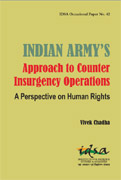Indian Army’s Approach to Counter Insurgency Operations: A Perspective on Human Rights
 The Indian Army has undertaken sub-conventional operations, especially counterinsurgency and counter-terrorism for over 60 years. During this period, there has been an evolutionary shift in its approach to such operations. However, there are certain guidelines that have come to define them. Amongst these, the relevance of human rights remains possibly the most important. Despite its criticality, the subject has been been researched inadequately, especially from the army’s perspective. This paper attempts to fill this void by analysing three factors that remain the most important constituents of the army’s approach to human rights. These include its incorporation as part of the doctrinal evolution, organisational structuring and procedural aspects and finally operational issues. The paper restricts its focus to Jammu and Kashmir in order to link its peculiar circumstances to the conduct of the army.
The Indian Army has undertaken sub-conventional operations, especially counterinsurgency and counter-terrorism for over 60 years. During this period, there has been an evolutionary shift in its approach to such operations. However, there are certain guidelines that have come to define them. Amongst these, the relevance of human rights remains possibly the most important. Despite its criticality, the subject has been been researched inadequately, especially from the army’s perspective. This paper attempts to fill this void by analysing three factors that remain the most important constituents of the army’s approach to human rights. These include its incorporation as part of the doctrinal evolution, organisational structuring and procedural aspects and finally operational issues. The paper restricts its focus to Jammu and Kashmir in order to link its peculiar circumstances to the conduct of the army.
About the Author
Colonel Vivek Chadha(Retd) served in the army for over 22 years before joining IDSA in 2011, as a Research Fellow. His areas of research include defence studies, counter insurgency and terrorism finance. His published books include, Lifeblood of Terrorism: Countering Terrorism Finance, Low Intensity Conflicts in India: An Analysis and Indo-US Relations: Divergence to Convergence. He has also edited, Armed Forces Special Powers Act: The Debate. He is the co-editor of the annual Asian Strategic Review and is on the editorial board of the Journal of Defence Studies.
Download Occasional Paper [PDF]




